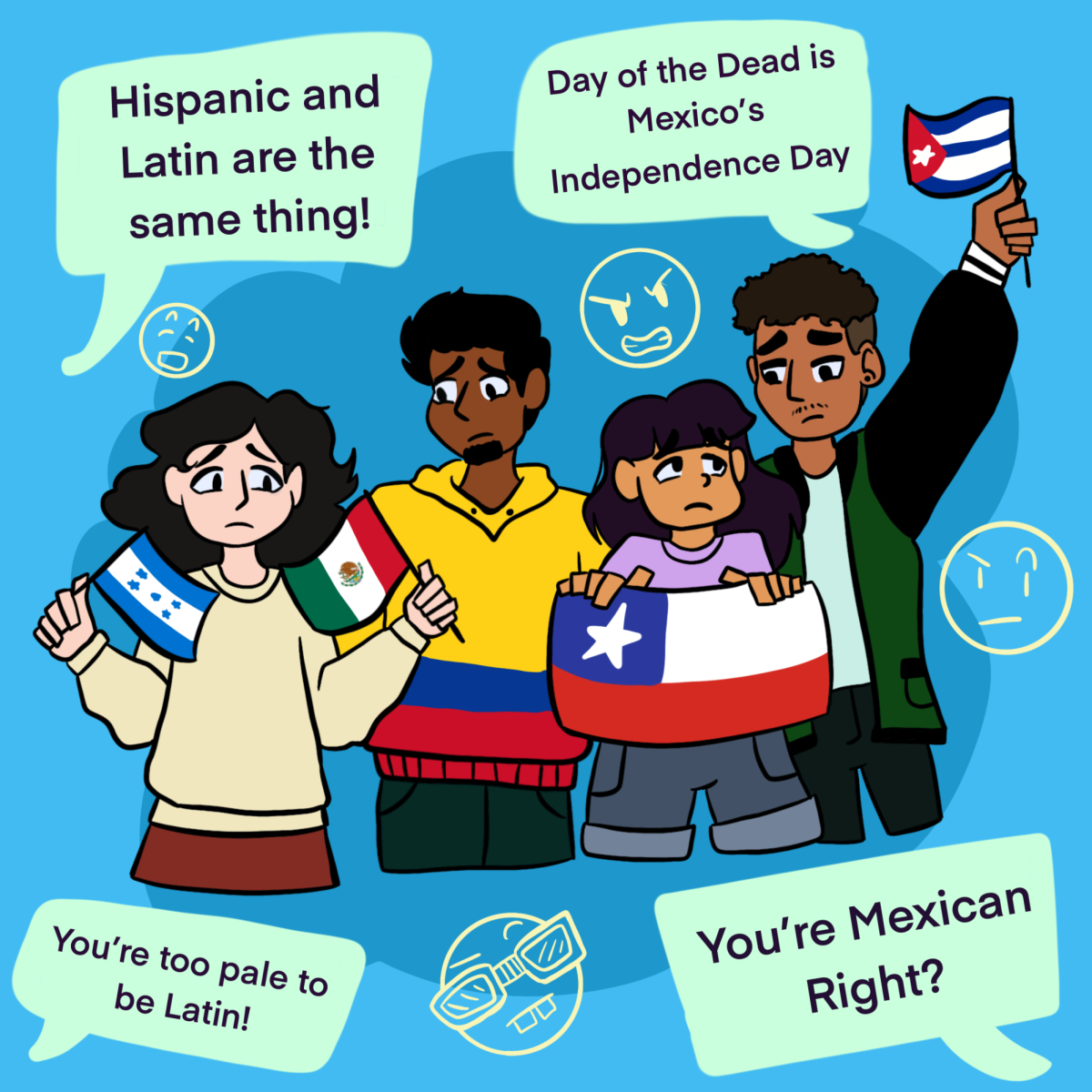Hispanic Heritage Month is celebrated from Sept. 15 to Oct. 15 to uplift, honor and recognize the achievements of Hispanic Americans. It provides the opportunity to honor our heritage and be proud of our culture. At this time, giving space and education is crucial amidst the callous efforts of ignorant humans to portray Hispanics as aliens and criminals. As college students, exposure to inaccurate history, articles and stereotypes is unavoidable, and ignoring it is part of the problem. Here are three points to know throughout the month, and take this to heart: Ignorance is not bliss, it’s plain stupidity.
#1 Terminology refresher: Hispanic ≠ Latinx
Multiple terms are involved within the community, such as Hispanic and Latinx. While many use the terms interchangeably, they aren’t. Hispanic represents those who are from or descendants of countries that have Spanish as a primary language. At the same time, Latinx refers to people who are from or related to people from Latin America. Latin America consists of 20 countries from North and South America and the Caribbean. In short, Hispanic refers to language, while Latinx refers to the geographic location. However, there are exceptions. Brazilians are Latinx, but not Hispanic, as their official language is Portuguese. Spaniards are Hispanic but not Latinx, as they’re located in Europe. And with more diversity in the community, people may have lineage from both, allowing them to identify with both terms. Not all cultures are the same, but they are worthy of recognition and pride. Don’t attempt to substitute one term for another or assume someone’s ethnicity. Both communities deserve more than a racist assumption built on misinformation. As seen, the use of the term Latinx in this article is intentional; to provide an ungendered version of the word Latino to be as inclusive as possible. While there is debate about using the word and its popularity, non-Latinx people need to understand that this argument is between the community, not others. Being aware of not butting into a conversation not relevant to oneself will go a long way.
#2 It celebrates several countries, not just Mexico
Hispanic Heritage Month celebrates the independence of Hispanic countries from their colonizers and highlights the struggles and conflicts they endured to achieve it. Costa Rica, El Salvador, Guatemala, Honduras and Nicaragua celebrate their independence from Spain on Sept. 15, with Mexico and Chile gaining theirs on Sept. 16 and Sept. 18, respectively. As a clarification, Mexico’s Independence Day is not Cinco de Mayo; a simple Google search will show that. It is essential for these countries to celebrate their accomplishments from the beginning to the present and recognize the foundations of their history. Their victory over the oppression and exploitation they faced should not be overshadowed by xenophobes with personal agendas. Be open to learning more about each country and the important Hispanic & Latinx figures within them, such as Sylvia Mendez, Sonia Sotomayor, Julia Alvarez and more.
#3 All Hispanics do not look the same
There is a stereotype that all Hispanics are brown, which is plain wrong and ignorant. As these countries are spanned across the earth, there is no singular shade of melanin that represents all Hispanics. They range from light skin to dark skin, and this is what makes the community more beautiful. The color of someone’s skin does not immediately identify them, but that does not mean that one should be embarrassed about it. They also do not wear the same clothes, speak the same language or even have similar features. These do not factor into whether or not they are lesser Hispanics. Embracing this diversity and removing this prejudicial belief is imperative to respect the community and culture that exists.
These aren’t the only important aspects of Hispanic Heritage Month. Being able to understand and respect other ethnicities is the basis of being a good person. As you progress into college, you don’t have an excuse to be uninformed and ignorant. As of 2022, 8.1% of App State students are Hispanic/Latinx who are proud of their heritage and willing to showcase their culture. Observing Hispanic Heritage Month and allowing oneself to be educated is all one can ask. Giving this community the respect it deserves is more important than promoting false stereotypes.
Para leer en español hace clic aquí.






J. L. Borges • Sep 26, 2023 at 6:53 pm
I admire your attempt to bring some clarity to a particularly murky cultural arena, but I think even you miss the mark. The attempt to forge a singular identity out of varied people groups that originate from the Spanish and Portuguese imperial conquests is, ultimately, asinine. At best, language is a tenuous thread to bind large groups of people as an Argentine speaking voseo hardly sounds like a Gallego let alone a Mexican national whose mother tounge is Mayan. To even try and clump the millions of Portuguese speaking Brazilians into one category associated with any Spanish speakers is even crazier. Brazil is basically as large as the US and has a population nearly as diverse in heritage, from Afro-Carribean descendents in the North East to Polish, Japanese, and German Brazilians in the South–not to mention all of the native, pre-colonials.
It is perhaps well intention to have a “Hispanic Heritage” month but it is misguided. Hispanic is not a race, nor is Latino. It can’t even be considered a singular culture within one American country (I didn’t even mention the Aymara or Guarani, the Austrio-Mexicans, or the fact that Equitorial Guinea could also be considered “Hispanic” but at the same time African).
At best Hispanic/Latino are language families with shared history as bloody and tragic as any of the New World.